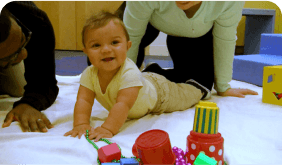Wondering how to help your child sleep better?
Sleep is important for your child as they reach school age and need to have the energy and attention to tackle each day. From ages 2-12, they should get an average of around 10 hours a night.
But bedtime can present challenges for children—an issue that’s common among little ones! In fact, many children deal with sleep issues that make it harder for them to fall asleep, stay asleep, or stay awake.
If you think your child may have issues with sleep, we have some possible solutions!
See below for what you can try, and if you’re not seeing any changes, consider reaching out to a healthcare provider.
Ask your child what’s making it difficult to sleep
Go right to the source! Ask your child if there is anything that’s making it hard from them to fall and stay asleep. Of course, they may not have the vocabulary or ability to tell you, but it’s important you hear from them if possible. Some common issues include:

Nervousness, like a fear of the dark or of being alone in their room.
Trouble winding down, which may make them feel anxious, upset or like they can’t stop moving.
Breathing issues, like sleep apnea or snoring (which to them may feel like waking up with a sore throat or waking up often) or irregular breathing. If you suspect a breathing issue, we recommend visiting a healthcare professional to find the best solution.
Take a sleep audit
Track how many hours your child sleeps every night. Also, track the temperature of their room and overall room conditions. Play around with these factors to find what works for them, and try your best to replicate it nightly.
Build healthy habits with a routine
Try to establish an evening routine to regulate their activity and balance energy levels. This can particularly help nervous sleepers, as a routine will help them to build confidence.
Limit screen time, especially right before bed
The blue light emitted from screens can decrease melatonin levels, which is an issue because melatonin helps kids sleep. Swap out screens for books before bed; either reading to them, or having them read to you or themselves can be a calming and beneficial activity that also helps with communication development.
Avoid eating right before bed
Especially sugary foods or excess amounts of food. Eating before bed can keep their stomach rumbling in bed, which can lead to restless nights.

Keep them active during the day
Burning energy during the day can lead to more quality, deep sleep at night. Try to keep them physically active and stimulate their mind throughout the day.
Address their fears
If you think you may have a nervous sleeper, they may come running to your room, telling you why they’re scared. Rather than ignoring their fears, listen to what they have to say and reassure them everything will be alright. If possible, explain to them how they could have experienced what they did, like the source of a sound. Try to encourage them to stay in their bed rather than sleep in yours; this may mean you need to sit by theirs as they fall back asleep, but it’s better to get them comfortable in their room.
If any of these issues persist, connect with your child’s healthcare provider to figure out what could be happening.





